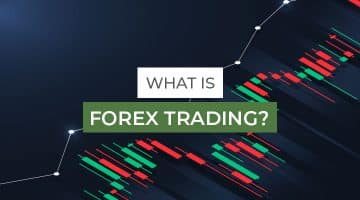Pending Orders vs Market Orders

In this article
An order is an offer sent through your trading platform to open or close a transaction through predetermined instructions.
This means that by placing orders, you’ll know how to enter or exit a trade.
There are two types of orders you’ll come across in your trading journey; pending and market orders.
Let’s explain each one of them in detail.
1. Pending orders
A pending order is a trader’s direction to buy or sell a currency pair if specific preconditions are met.
When a trader places a pending order, they are essentially telling their broker that they do not want the current market price but rather that they only want their order executed if the market price hits a particular level.
Limit orders and stop orders are the two types of pending orders.
a. Limit orders
Limit orders can only be executed at the trader’s selected limit price. Limit orders are classified into two types: buy limit and sell limit.
Buy limit
A buy limit order indicates that you are willing to buy a currency pair at a certain price or better. Suppose you want to buy the GBP/USD pair at $1.3900, which is now cheaper than the market. When the market falls to $1.3850, you are only willing to buy it at that price or below. If your pricing is not met, nothing happens. The position will cost you $13900 or less.
Sell limit
This is obviously the inverse of a buy limit order, as you are specifying a certain price at which you wish to sell the currency pair.
For example, the GBP/USD pair is currently trading at 1.3800. You notice that the price could reach 1.3700. If the price falls below 1.3700, your sell limit will be reached.
Limit orders are useful in preventing slippage since they guarantee that an order will be filled within the given limits or not at all. However, while they may prevent slippage, they risk not being filled during periods of strong volatility.
b. Stop orders
Stop orders, which tell positions to open or close when certain prices are reached, are extensively employed to lock in profits and reduce losses. Stop orders are classified into two types: buy stops and sell stops.
Buy stop
A buy stop simply informs the broker that you wish to purchase a currency pair at a certain price.
For example, suppose you are short the EUR/USD pair at 1.2000 but realise you are incorrect in your position. If the market reaches 1.2050, you place a buy stop at the level to guard your account. This means that as soon as the market reaches 1.2050, you close the trade by buying back the position.
Sell stop
The stop price for sell stop orders is given. In the instance of a sell stop order, you would provide a price at which you would like to sell. If the market price of the forex pair moves to the stop price, a sell market order is triggered.
2. Market orders
A market order is a type of order designed to achieve instant execution upon availability by buying or selling an asset at the best price available at the time of execution.
Market orders never guarantee a particular price; you never know what you could end up getting as everything really depends on availability.
One thing to keep in mind while using market orders is to keep an eye on the spread, which is the difference between the bid and ask price.
Spreads are constantly changing, especially in the aftermath of important news events such as a Fed rate decision or a non-farm payroll report.
There are two types of market orders; buy and sell.
a. Buy
This type of market order is used to buy a currency pair at the best available price. For example, the bid price for GBP/USD is currently at 1.4050, and the ask price is at 1.4052
If you want to buy GBP/USD, then it would be sold to you at the price of 1.4052. You click on the buy option on your trading platform, and boom, your buy order is placed.
b. Sell
This type of market order is used to sell a currency pair at the best available price. For example, the bid price for GBP/USD is currently at 1.4120, and the ask price is at 1.4122
If you wanted to sell GBP/USD, then you’ll sell it at 1.4120.
Pending vs Market orders? Which one should you choose?
Because of their simplicity, many traders prefer market orders. You simply place a buy or sell order, and voila!
Market orders are useful if you happen to be nearby when a currency pair begins to trade; however, keep the bid-ask spread in mind. An unfavourable spread, particularly during the forex sessions overlap like Asian to London, and market open, can derail an otherwise attractive position.
Sometimes you don’t have enough time on your hands, so pending orders can come in handy. By placing pending orders, you don’t have to watch every price tick on the chart. This saves you time and mental exhaustion.
Your trading approach will determine whether you employ market orders, pending orders, or a combination of the two. It all boils down to what suits your personality and attitude to the markets, as with most else we do.
If you know you won’t be at the computer when a market retests a certain level; pending orders are a great option. Just double-check your numbers because you won’t be able to correct any errors on the order ticket.
Whether you utilise market or pending orders, having some type of slip protection is a good idea.
Most trading platforms have this option built-in, but if you’re not sure where to look, simply ask your broker for help.
Bottom line
Before placing any type of order, make sure to check with your broker if they charge any hidden fee for placing an order. Also, do ask your broker are there any rollover fees for holding positions longer than one day.
Jason Morgan is an experienced forex analyst and writer with a deep understanding of the financial markets. With over 13+ years of industry experience, he has honed his skills in analyzing and forecasting currency movements, providing valuable insights to traders and investors.
Forex Content Writer | Market Analyst
Relevant Posts

Forex Trading in Zimbabwe
[top_three_brokers] Like many African countries, Zimbabwe has recently turned its attention towards forex trading. As…
Read more

Should I Use a Welcome Bonus?
[top_three_brokers] A welcome bonus is an introductory type bonus that is offered to the new…
Read more

Best Trading Platforms Reviewed
[top_three_brokers] Naturally, many traders are interested in learning about the best trading platform. One of…
Read more

What is Forex Trading all about?
[top_three_brokers] What is Forex trading? How does Forex trading work? Forex trading is the buying and selling…
Read more

The History Behind Fibonacci
[top_three_brokers] If you have heard the word Fibonacci, you know that it has something to…
Read more

Heiken Ashi Indicator Explained
[top_three_brokers] Do you know what the Heikin Ashi technique is all about and for what…
Read more

Price Action Trading Explained
[top_three_brokers] In the fast-paced world of forex, price action is the foundation stone for technical analysis. Many…
Read more

Market Technical Analysis
[top_three_brokers] Whenever someone starts their trading journey, they open a chart, and clouds of disbelief…
Read more

Japanese Candlesticks Explained
[top_three_brokers] The traders use the Japanese Candlesticks to construct charts and analyse the price movement…
Read more

Should I Use a No Deposit Bonus?
[top_three_brokers] The term “no deposit bonus” refers to the fact that new traders can open…
Read more

Forex Trading in Zimbabwe
[top_three_brokers] Like many African countries, Zimbabwe has recently turned its attention towards forex trading. As…

Should I Use a Welcome Bonus?
[top_three_brokers] A welcome bonus is an introductory type bonus that is offered to the new…

Best Trading Platforms Reviewed
[top_three_brokers] Naturally, many traders are interested in learning about the best trading platform. One of…

What is Forex Trading all about?
[top_three_brokers] What is Forex trading? How does Forex trading work? Forex trading is the buying and selling…

The History Behind Fibonacci
[top_three_brokers] If you have heard the word Fibonacci, you know that it has something to…

Heiken Ashi Indicator Explained
[top_three_brokers] Do you know what the Heikin Ashi technique is all about and for what…

Price Action Trading Explained
[top_three_brokers] In the fast-paced world of forex, price action is the foundation stone for technical analysis. Many…

Market Technical Analysis
[top_three_brokers] Whenever someone starts their trading journey, they open a chart, and clouds of disbelief…

Japanese Candlesticks Explained
[top_three_brokers] The traders use the Japanese Candlesticks to construct charts and analyse the price movement…

Should I Use a No Deposit Bonus?
[top_three_brokers] The term “no deposit bonus” refers to the fact that new traders can open…


